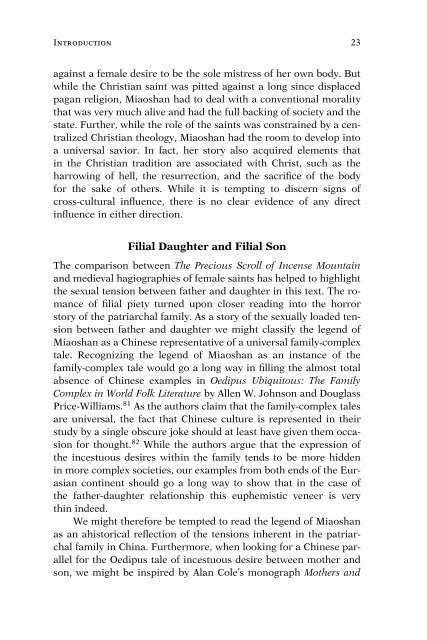Two Precious Scroll Narratives of Guanyin and Her ... - Khamkoo
Two Precious Scroll Narratives of Guanyin and Her ... - Khamkoo
Two Precious Scroll Narratives of Guanyin and Her ... - Khamkoo
Create successful ePaper yourself
Turn your PDF publications into a flip-book with our unique Google optimized e-Paper software.
Introduction 23<br />
against a female desire to be the sole mistress <strong>of</strong> her own body. But<br />
while the Christian saint was pitted against a long since displaced<br />
pagan religion, Miaoshan had to deal with a conventional morality<br />
that was very much alive <strong>and</strong> had the full backing <strong>of</strong> society <strong>and</strong> the<br />
state. Further, while the role <strong>of</strong> the saints was constrained by a centralized<br />
Christian theology, Miaoshan had the room to develop into<br />
a universal savior. In fact, her story also acquired elements that<br />
in the Christian tradition are associated with Christ, such as the<br />
harrowing <strong>of</strong> hell, the resurrection, <strong>and</strong> the sacrifice <strong>of</strong> the body<br />
for the sake <strong>of</strong> others. While it is tempting to discern signs <strong>of</strong><br />
cross-cultural influence, there is no clear evidence <strong>of</strong> any direct<br />
influence in either direction.<br />
Filial Daughter <strong>and</strong> Filial Son<br />
The comparison between The <strong>Precious</strong> <strong>Scroll</strong> <strong>of</strong> Incense Mountain<br />
<strong>and</strong> medieval hagiographies <strong>of</strong> female saints has helped to highlight<br />
the sexual tension between father <strong>and</strong> daughter in this text. The romance<br />
<strong>of</strong> filial piety turned upon closer reading into the horror<br />
story <strong>of</strong> the patriarchal family. As a story <strong>of</strong> the sexually loaded tension<br />
between father <strong>and</strong> daughter we might classify the legend <strong>of</strong><br />
Miaoshan as a Chinese representative <strong>of</strong> a universal family-complex<br />
tale. Recognizing the legend <strong>of</strong> Miaoshan as an instance <strong>of</strong> the<br />
family-complex tale would go a long way in filling the almost total<br />
absence <strong>of</strong> Chinese examples in Oedipus Ubiquitous: The Family<br />
Complex in World Folk Literature by Allen W. Johnson <strong>and</strong> Douglass<br />
Price-Williams. 81 As the authors claim that the family-complex tales<br />
are universal, the fact that Chinese culture is represented in their<br />
study by a single obscure joke should at least have given them occasion<br />
for thought. 82 While the authors argue that the expression <strong>of</strong><br />
the incestuous desires within the family tends to be more hidden<br />
in more complex societies, our examples from both ends <strong>of</strong> the Eurasian<br />
continent should go a long way to show that in the case <strong>of</strong><br />
the father-daughter relationship this euphemistic veneer is very<br />
thin indeed.<br />
We might therefore be tempted to read the legend <strong>of</strong> Miaoshan<br />
as an ahistorical reflection <strong>of</strong> the tensions inherent in the patriarchal<br />
family in China. Furthermore, when looking for a Chinese parallel<br />
for the Oedipus tale <strong>of</strong> incestuous desire between mother <strong>and</strong><br />
son, we might be inspired by Alan Cole’s monograph Mothers <strong>and</strong>

















